How to Verify Supplier: A Comprehensive Step-by-Step Guide
Learn effective methods to verify suppliers and enhance your supply chain reliability.

Overview:
Supplier verification is a critical process that ensures the reliability and quality of products from vendors, involving steps such as background checks, documentation requests, and financial evaluations. The article emphasizes that a robust verification process mitigates risks associated with poor product quality, enhances supply chain integrity, and ultimately leads to improved customer satisfaction and brand reputation, supported by tools and technologies like supplier management software and blockchain.
Key Highlights:
- Supplier verification is essential for ensuring reliability and quality in vendor products.
- A strong vendor assessment process can mitigate risks associated with poor product quality, which can lead to customer dissatisfaction and financial losses.
- Key steps in supplier verification include identifying potential vendors, conducting research, requesting documentation, and evaluating financial stability.
- Utilizing tools like supplier management software, background check services, and quality management systems can enhance the verification process.
- Challenges in supplier verification include lack of transparency, inconsistent documentation, cultural differences, and high expenses.
- Compliance and regulatory considerations are crucial, especially in regulated industries, ensuring vendors meet quality, environmental, and labor standards.
- Adopting technologies such as AI and blockchain can improve the efficiency and transparency of supplier verification processes.
- Effective supplier verification not only enhances supply chain integrity but also contributes to customer satisfaction and brand reputation.
Introduction
In an increasingly interconnected global marketplace, the integrity of supply chains hinges on the rigorous verification of suppliers. As businesses navigate the complexities of sourcing, understanding the multifaceted nature of supplier verification becomes essential. This process not only safeguards product quality and reliability but also aligns with evolving compliance and regulatory standards.
With a growing trend towards outsourcing and heightened consumer expectations, companies must adopt comprehensive strategies to evaluate potential suppliers thoroughly. From conducting background checks to leveraging advanced technologies, the need for effective supplier verification is more critical than ever.
This article delves into the significance of supplier verification, outlining best practices, tools, and methods that can enhance operational efficiency and foster sustainable supplier relationships.
Understanding Supplier Verification: Importance and Overview
The procedure to verify suppliers is crucial for ensuring the reliability and quality of items obtained from vendors. This multifaceted evaluation encompasses a thorough assessment of a provider's credentials, financial stability, and operational capabilities. In today's competitive environment, where firms like Cadent Golf, Karma Heart, and Luminate Press have prospered by utilizing OpsNinja's platform, recognizing the importance of strong provider validation becomes essential.
As Christine Evans, Sr. Director of Marketing at Fictiv, emphasizes,
These important supply chain statistics will provide insight into the future of supply chain management and give you a competitive advantage.
This insight is particularly relevant in light of the fact that 42% of businesses are increasingly outsourcing in engineering due to a talent shortage, a trend that 97% of supply chain leaders anticipate will continue. Such dynamics highlight the essential requirement to verify suppliers through thorough vendor assessment methods to reduce risks linked to inferior products, which can result in customer discontent and financial losses.
For instance, OpsNinja has enabled brands like Hash Stash to streamline their quality assurance systems, significantly reducing negative reviews and enhancing customer satisfaction. Key aspects of an effective vendor assessment process include:
- Conducting comprehensive background checks
- Verifying suppliers
- Ensuring compliance with industry standards
Moreover, insights from experts like Marijn Overvest, who has trained over 200 procurement teams globally, underscore the importance of these verification measures.
By prioritizing these strategies, companies can not only enhance their supply chains but also significantly improve customer experiences. To learn more about how OpsNinja can help your brand succeed, explore our detailed case studies and discover the secrets to successful niche product creation and online sales.
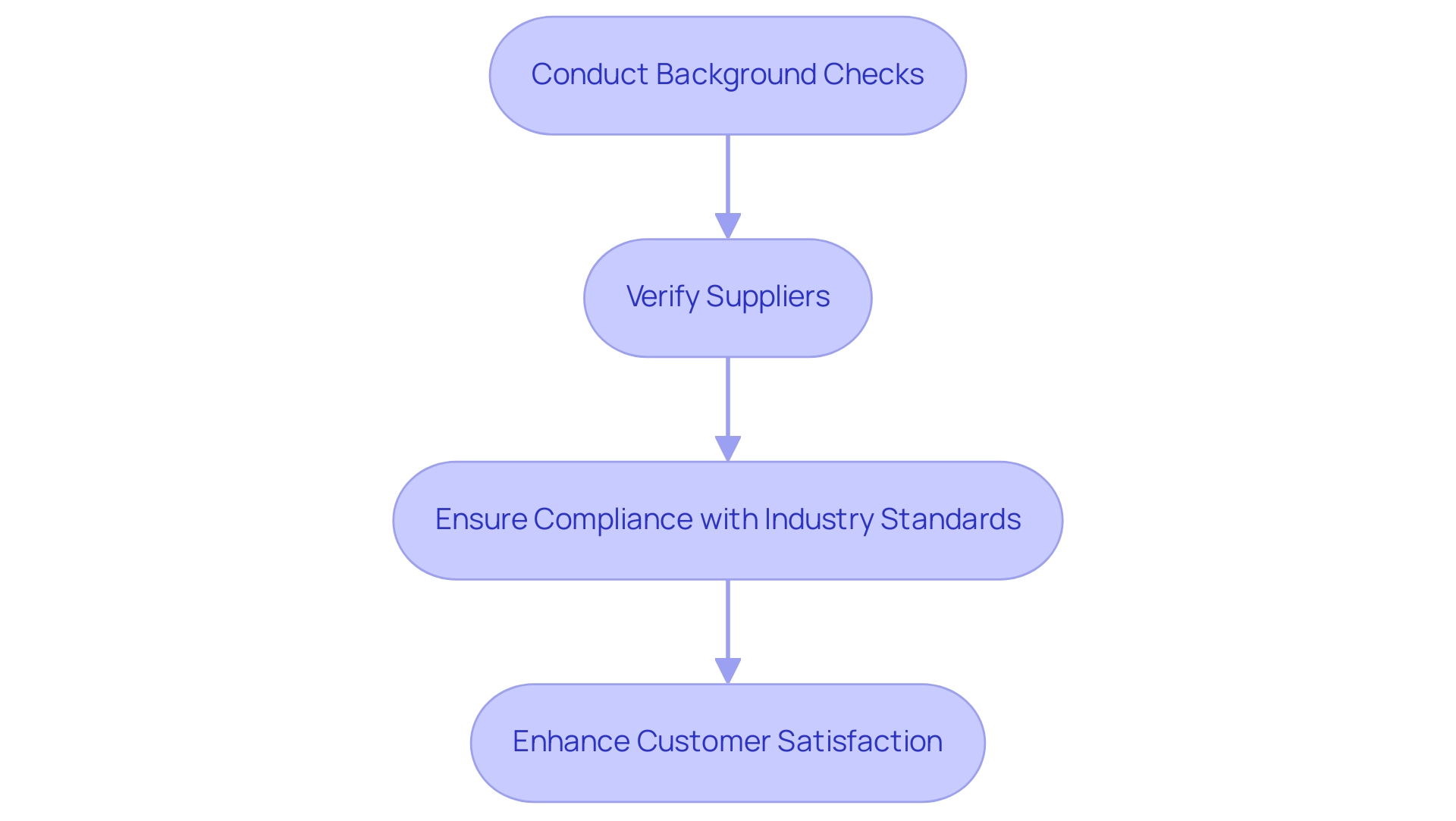
Step-by-Step Process for Verifying Suppliers
-
Identify Potential Vendors: Begin by compiling a comprehensive list of potential vendors tailored to your product requirements. Utilize industry directories, attend trade shows, and leverage online platforms to source candidates effectively. This foundational step is crucial, as 67% of global executives find ESG regulations complex; thus, selecting the appropriate vendors can significantly ease compliance burdens.
-
Conduct Initial Research: Undertake a thorough review of each vendor's online presence. Analyze their website, scrutinize online reviews, and assess their social media engagement to gather preliminary insights into their reputation and reliability. This research is essential in identifying providers who align with your values, especially with sustainability becoming a core component of procurement strategies.
-
Request Documentation: Proactively seek essential documentation from providers, including business licenses, certifications, and their quality assurance processes. This step is critical to verify the supplier's legitimacy and ensure they meet industry standards.
-
Perform Background Checks: Engage third-party services to conduct comprehensive background checks on potential vendors. Investigate for any red flags, such as legal complications or signs of financial instability, which could jeopardize your supply chain integrity. As supply chain experts suggest, "Address FSVP violations immediately and conduct a root cause analysis to prevent future issues."
-
Evaluate Financial Stability: Assess the financial health of vendors by reviewing credit reports and financial statements. This evaluation will help you determine their ability to fulfill orders consistently, safeguarding your operations from potential disruptions.
-
Visit the Supplier’s Facility: Whenever feasible, arrange an on-site visit to the supplier’s facility. This firsthand assessment allows you to verify supplier operations, control processes, and overall capabilities to ensure they meet your standards.
-
Request Samples: Prior to making a full commitment, request product samples to evaluate quality and compliance with your specific requirements. This step is essential for confirming that the supplier can deliver the products you need.
-
Streamlined Inspection Booking System: Reserve your initial inspection in minutes with our storefront integrations and simple booking method. This not only facilitates quick and efficient assurance but also allows D2C brands to respond to customer feedback rapidly, thereby helping to safeguard your brand against negative reviews and customer issues. By simplifying this procedure, D2C brands can guarantee that inspections are carried out promptly, upholding a high standard that resonates with their customer base.
-
Review Contracts and Agreements: Before proceeding with any partnership, ensure that all terms are clearly defined in a contract. Pay particular attention to delivery schedules, payment terms, and standards to avoid misunderstandings and secure a mutually beneficial relationship. Furthermore, comprehending AQL numbers is crucial; these metrics direct the sampling process during inspection, determining acceptable defect levels and ensuring adherence to standards. For D2C brands, AQL numbers play a crucial role in maintaining product quality and consistency, as they help in identifying potential issues before products reach the market, thus protecting against negative customer experiences. By applying these best practices in vendor assessment, you can create a strong supply chain that aligns with your business objectives and sustainability efforts. Furthermore, consider the insights from Coupa's sustainability initiatives, which emphasize the importance of eco-friendly practices and responsible sourcing in creating a better planet. Moreover, utilizing blockchain technology can offer an unalterable record of transactions, further improving vendor authentication methods.
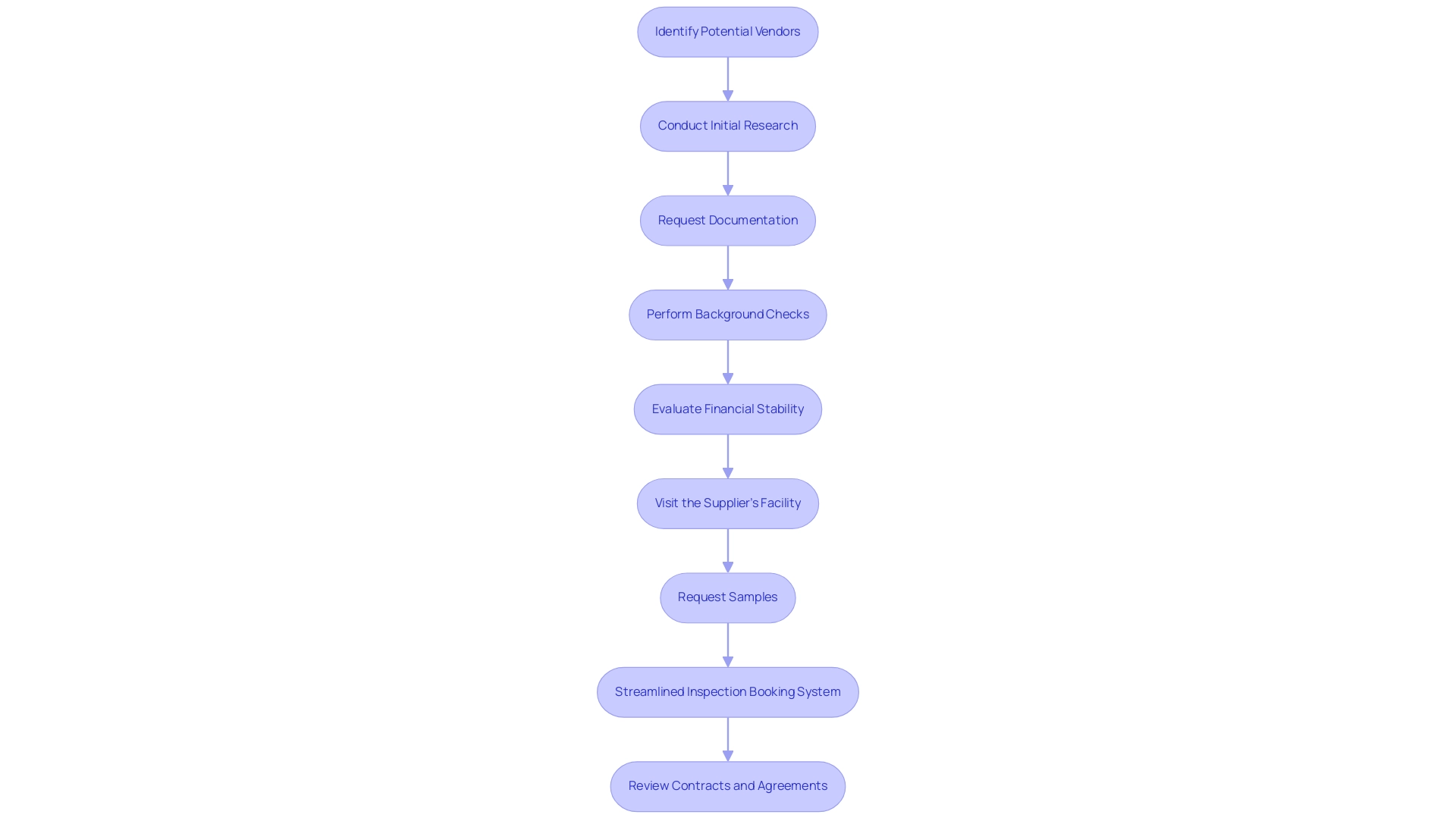
Tools and Methods for Effective Supplier Verification
To effectively enhance the supplier verification process in supply chain management, several robust tools and methods can be employed, particularly those offered by OpsNinja:
-
Supplier Management Software: Leading platforms such as SAP Ariba and Coupa integrate verification processes that streamline supplier relationships. OpsNinja enhances this experience with its dedicated support team, ensuring ongoing assessments and fostering a superior customer experience.
-
Background Check Services: Utilizing reputable services like Dun & Bradstreet or Experian allows businesses to conduct thorough background checks on potential vendors, a crucial step for assessing financial stability and reliability. OpsNinja emphasizes impartial standards control in these audits to verify supplier credibility through thorough background check evaluations, which include business registration, qualifications, and legal compliance.
-
Quality Management Systems (QMS): Implementing QMS, such as ISO 9001, standardizes control measures. OpsNinja’s commitment to maintaining high standards ensures that suppliers consistently meet defined criteria, enhancing overall product quality and reliability in D2C supply chains.
-
Blockchain Technology: This technology offers an immutable, decentralized ledger for transactions, ensuring transparency and security across various supply chain activities. By leveraging blockchain, OpsNinja enhances the process to verify supplier credentials, offering an additional layer of assurance.
-
Online Marketplaces: Platforms like Alibaba and ThomasNet offer valuable insights through vendor ratings and reviews. OpsNinja utilizes these evaluations to verify supplier trustworthiness, ensuring that only trustworthy vendors are considered.
-
Industry Associations: Engaging with industry-specific associations grants access to a network of verified vendors and best practices to verify supplier credentials. OpsNinja collaborates with these associations to enhance the credibility of its network.
The importance of clear metrics in assessing provider performance cannot be overstated. Identifying key performance indicators (KPIs)—such as on-time delivery, quality of goods, lead times, cost savings, and responsiveness—enables organizations to make data-driven decisions. These KPIs are essential for achieving organizational goals and enhancing vendor performance.
Furthermore, efficient supply chain risk management can provide over 70% extra company brand value, highlighting the essential aspect of strong supplier assessment methods. As noted by Marijn Overvest, founder of Procurement Tactics, "I have a deep passion for procurement, and I’ve upskilled over 200 procurement teams from all over the world." This highlights the importance of equipping teams with the right tools and methodologies to enhance procurement effectiveness.
Furthermore, taking into account that AI tools can further aid in collecting and examining results, making the validation process more efficient and insightful.
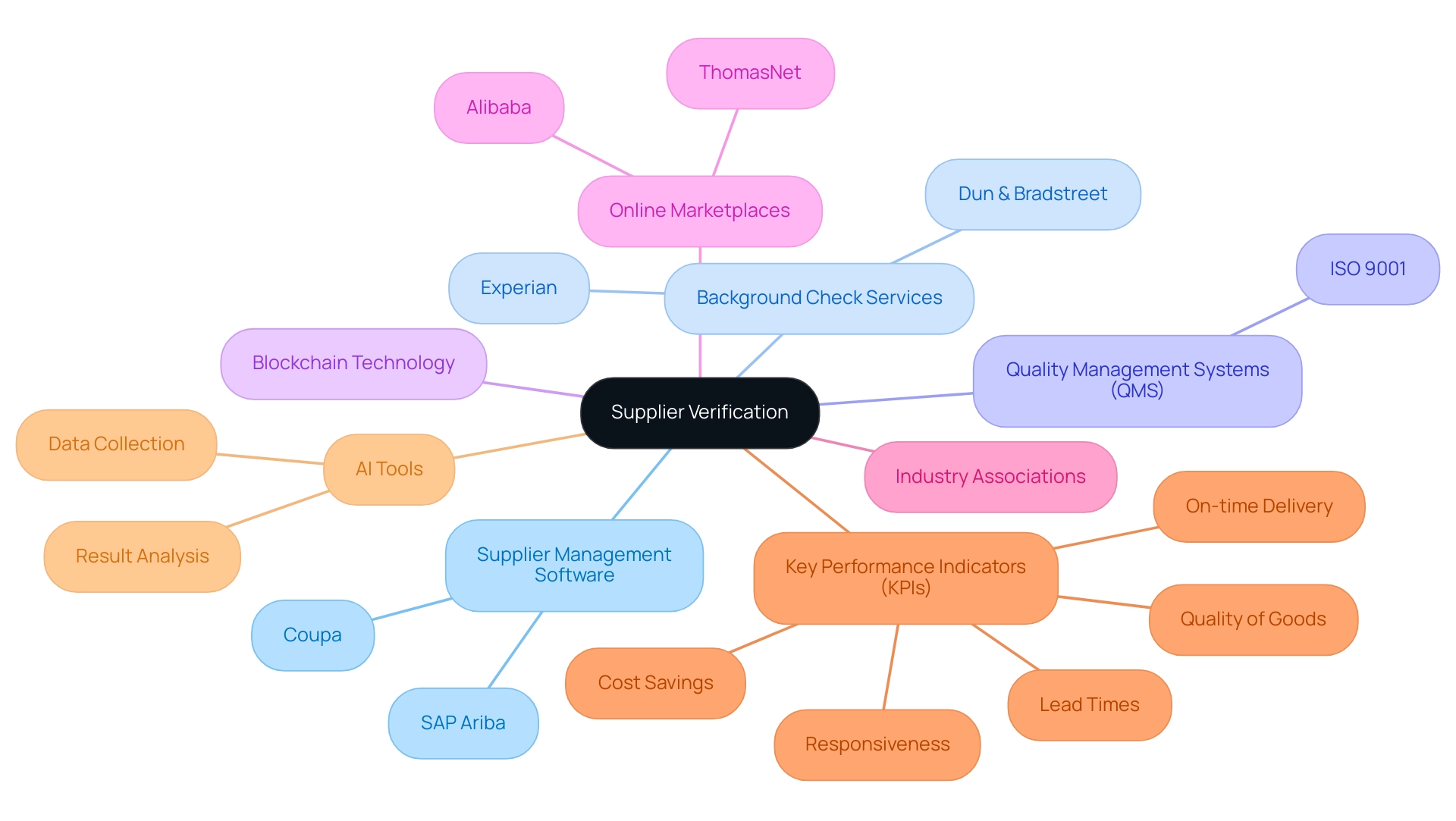
Overcoming Challenges in Supplier Verification
The need to verify suppliers poses several notable challenges that can significantly impact a D2C brand's operational efficiency. Key issues include:
-
Lack of Transparency: Suppliers may often hesitate to share necessary information, which can hinder effective collaboration. To encourage transparency, it is essential to create clear communication pathways and build a strong relationship with providers.
OpsNinja's customized strategy highlights personal interactions that promote transparency and enable more seamless exchanges. -
Inconsistent Documentation: In numerous instances, providers offer incomplete or inconsistent documentation, leading to potential compliance risks. To mitigate this, brands should clearly outline the required documents upfront and systematically follow up for clarifications.
OpsNinja's advanced quality control platform helps ensure that all submissions meet the necessary standards, protecting brand reputation. -
Cultural Differences: Navigating the complexities of international partners can be challenging due to cultural differences that may affect communication styles and expectations. Demonstrating patience and understanding is essential. Furthermore, employing a local intermediary can close communication gaps, but utilizing OpsNinja's expertise can improve collaboration among various vendors.
-
High Expenses: The validation procedure can lead to considerable expenses, especially when working with numerous providers. To handle these costs efficiently, focus on comprehensive assessment for high-risk vendors.
OpsNinja provides affordable tools and services that simplify the validation procedure, making it more manageable without compromising quality.
These challenges are not merely theoretical. For instance, the European trucking industry is currently grappling with a significant driver shortage, with 17% of jobs unfilled. This labor shortage highlights the necessity to verify supplier methods for improved validation to sustain operational efficiency in supply chains.
Industry leaders stress that enhancing working conditions is crucial to draw new drivers, which directly illustrates how provider transparency and assessment methods can influence overall supply chain operations.
Moreover, as organizations more frequently utilize risk management technologies, 57% indicate improved decision-making based on risk insights, underscoring the significance of effective practices to verify supplier quality.
Marisa Brown, Senior Principal Research Lead at APQC, notes, 'With the adoption of any new technology comes the need for organizations to address cybersecurity to prevent disruptions caused by security breaches.' This emphasizes the importance of incorporating cybersecurity factors into vendor assessment procedures.
Furthermore, companies such as Fictiv, which have produced over 25 million components for different clients, illustrate how efficient vendor assessment can foster innovation and quicker market delivery. Client testimonials highlight this: 'OpsNinja has revolutionized our vendor assessment system, making it effortless and dependable,' states a pleased customer. By tackling these challenges directly, D2C brand owners can utilize OpsNinja's dependable inspection services to enhance their vendor relationships and guarantee a more robust supply chain.
In contrast to other inspection companies, OpsNinja's contemporary quality control platform provides customized solutions that emphasize transparency and efficiency, distinguishing it in a competitive market. Don't let vendor assessment obstacles hinder your brand—reach out to OpsNinja today to find out how we can assist you in optimizing your processes and improving your operational efficiency.
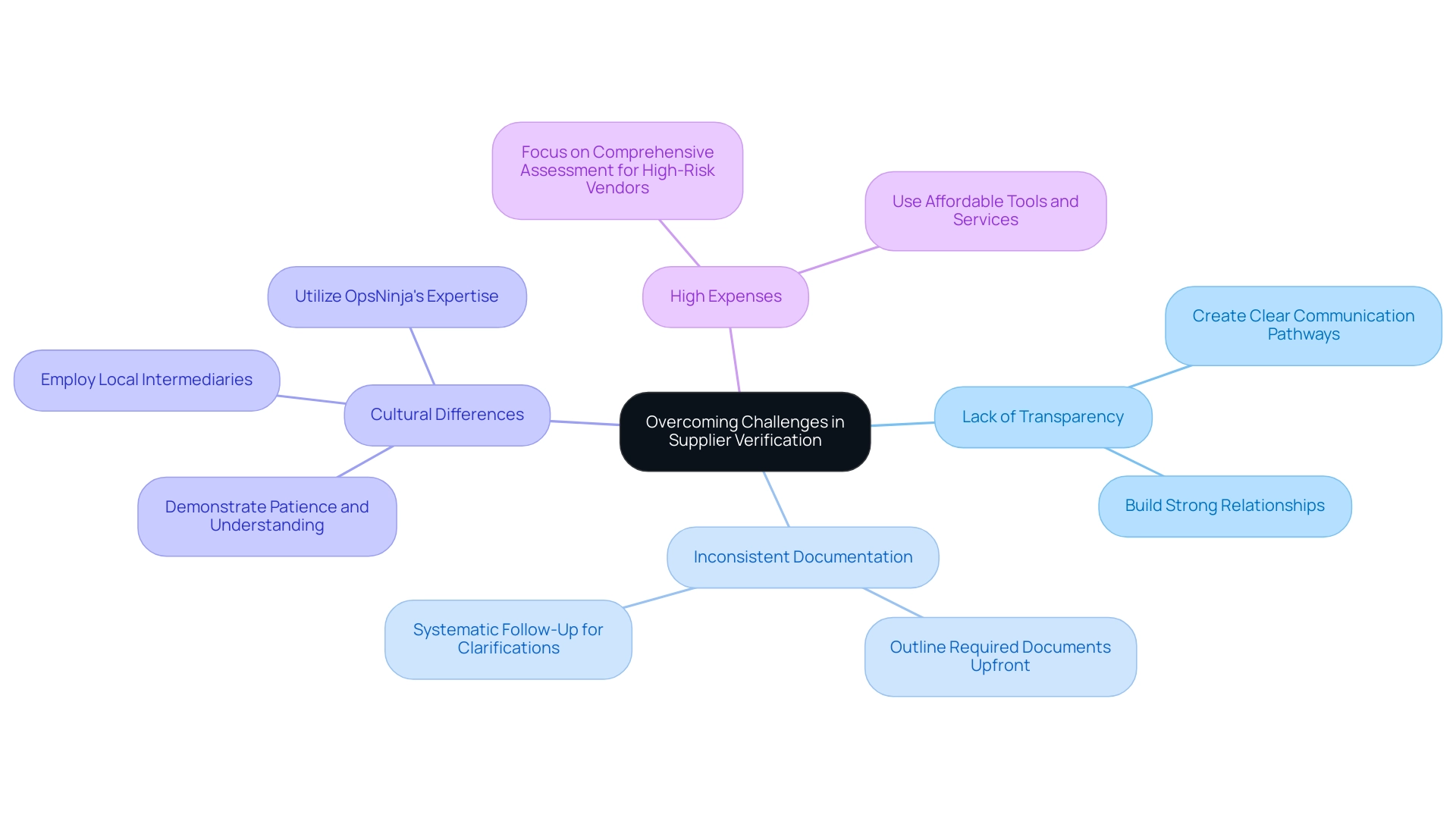
Compliance and Regulatory Considerations in Supplier Verification
In the realm of vendor verification, compliance and regulatory considerations are paramount, especially in industries with stringent regulations such as food, pharmaceuticals, and electronics. Ensuring that vendors adhere to relevant laws and standards is not merely a formality; it is essential for maintaining operational integrity and consumer trust. Key elements of compliance include:
- ISO Certifications: It is critical to verify that suppliers possess industry-recognized certifications, such as ISO 9001, which serve as benchmarks for quality management standards. Roughly 75% of vendors with ISO certifications show a dedication to ongoing enhancement and reliable standards, emphasizing the significance of top-tier product inspections.
- Environmental Regulations: Suppliers must comply with environmental laws to mitigate risks associated with sustainability and ethical sourcing practices. As businesses increasingly prioritize sustainability, having partners that adhere to these regulations becomes a competitive advantage, aligning with OpsNinja's proactive approach to quality assurance.
- Labor Laws: It is essential to verify supplier adherence to labor laws and ethical labor practices, particularly in regions where regulations may vary significantly. This not only safeguards your brand’s reputation but also aligns with global standards for ethical sourcing, further enhancing customer satisfaction.
- Product Safety Standards: In sectors like electronics and food, it is crucial to verify supplier adherence to established safety standards for consumer protection and to avoid potential legal repercussions. Regular audits and assessments, enabled by OpsNinja's integrated inspection tracking platform, are essential to verify supplier compliance and ensure ongoing vendor reliability.
As the landscape of compliance continues to evolve, organizations are increasingly recognizing the inadequacy of traditional compliance methods in managing emerging risks and regulations. A notable shift toward purpose-built technology and integrated platforms for compliance management has occurred, with a 31% rise in the adoption of AI for compliance functions and 70% of companies moving to cloud-based compliance solutions, as highlighted in the case study titled "Technology Trends in Compliance." Moreover, 27% of security and IT professionals ranked mitigating internal audit fatigue as a top compliance challenge, while 74% of professionals expressed that a cybersecurity incident due to insufficient vendor security was their biggest fear.
This trend highlights the importance of proactive vendor assessment methods to verify suppliers, ensuring they not only meet existing regulatory standards but also prepare businesses for upcoming challenges in compliance management, thereby protecting your brand from adverse reviews and customer discontent.
To see how OpsNinja can enhance your supplier verification and quality management processes, contact sales or create a free account to see OpsNinja in action.
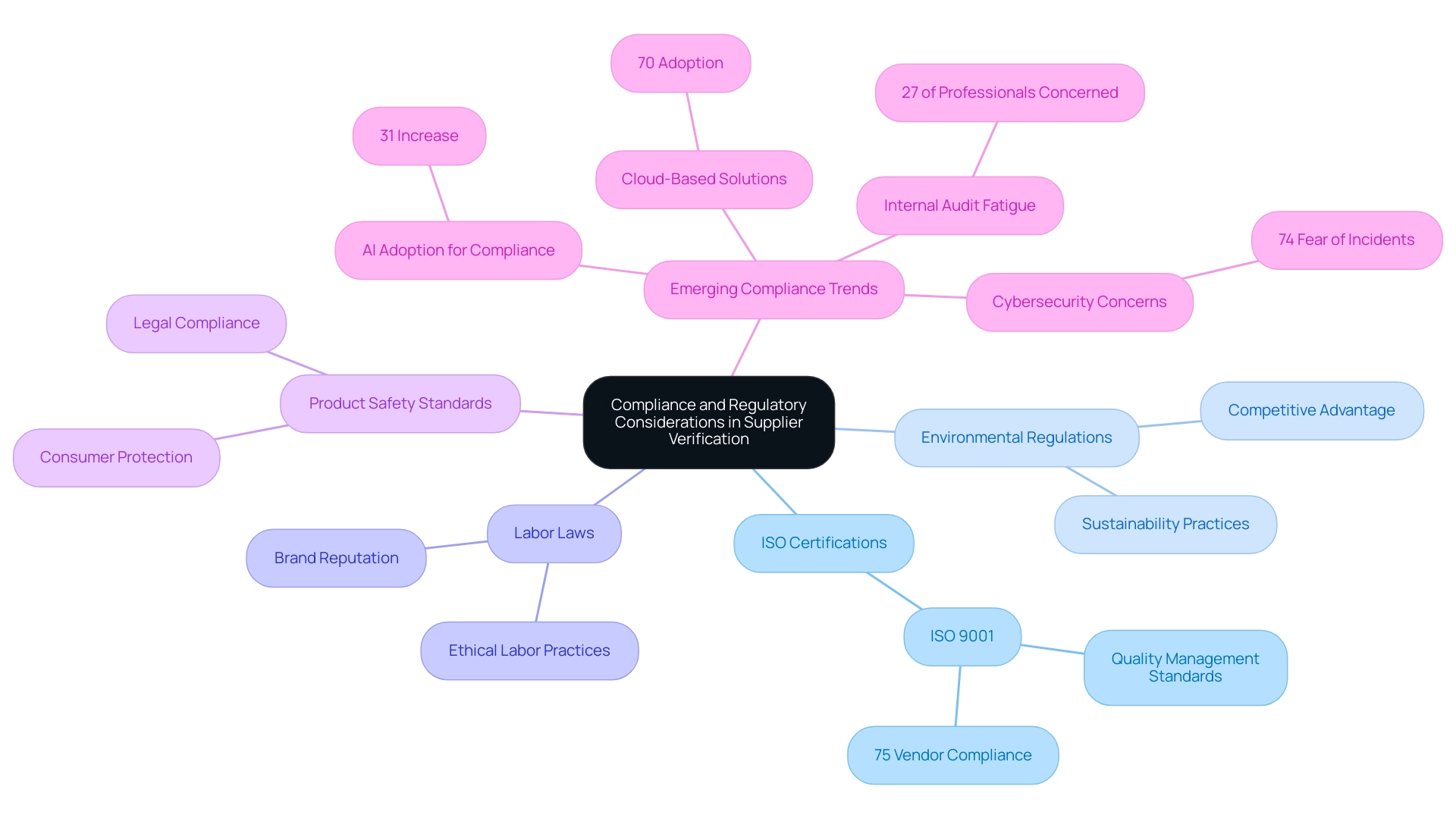
Conclusion
Supplier verification is a critical component of maintaining a resilient and efficient supply chain. As highlighted throughout this article, the process encompasses a comprehensive evaluation of potential suppliers, including:
- Background checks
- Financial assessments
- Compliance with industry standards
Implementing a structured verification process not only mitigates risks associated with product quality but also enhances customer satisfaction and brand reputation.
The step-by-step approach outlined provides a clear roadmap for businesses looking to refine their supplier evaluation methods. By utilizing advanced tools and technologies, such as:
- Supplier management software
- Blockchain
organizations can streamline their verification processes, ensuring transparency and reliability. Moreover, addressing challenges such as lack of transparency and inconsistent documentation is essential for fostering strong supplier relationships and maintaining operational efficiency.
In an era where compliance and regulatory considerations are paramount, prioritizing supplier verification can offer a significant competitive advantage. Companies that invest in robust verification processes are better positioned to navigate the complexities of the global marketplace while meeting the evolving expectations of consumers. By embracing best practices in supplier verification, businesses can not only protect their interests but also contribute to a sustainable and ethical supply chain landscape.



